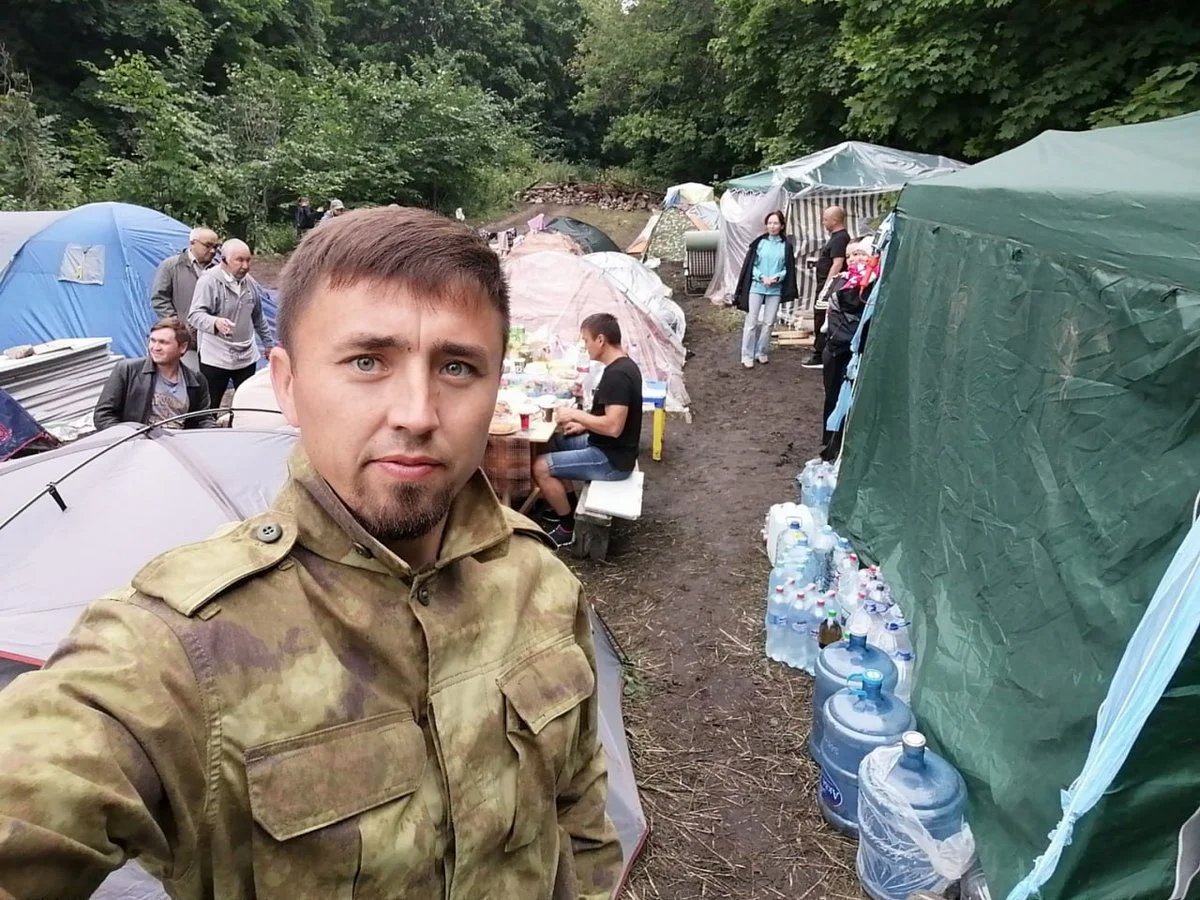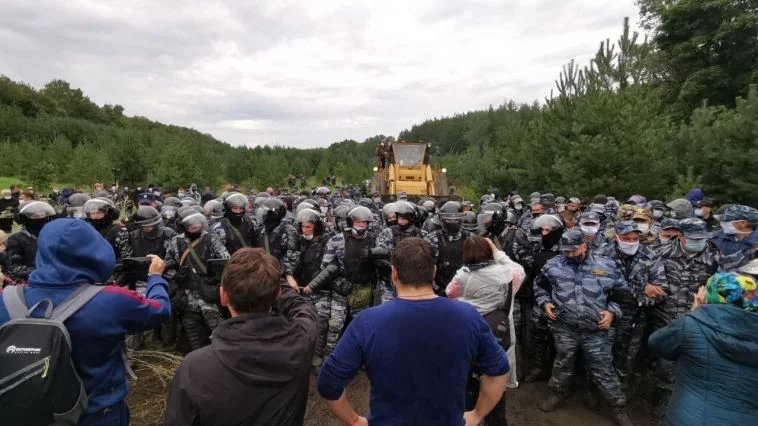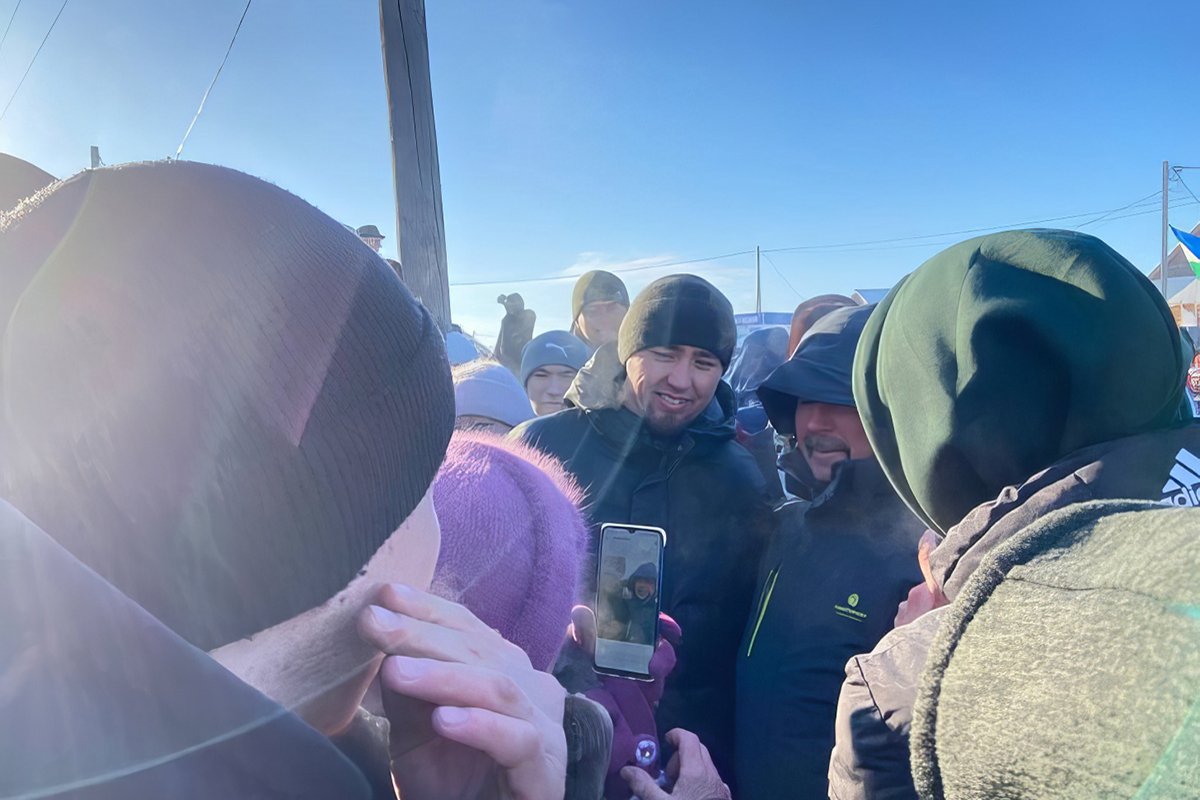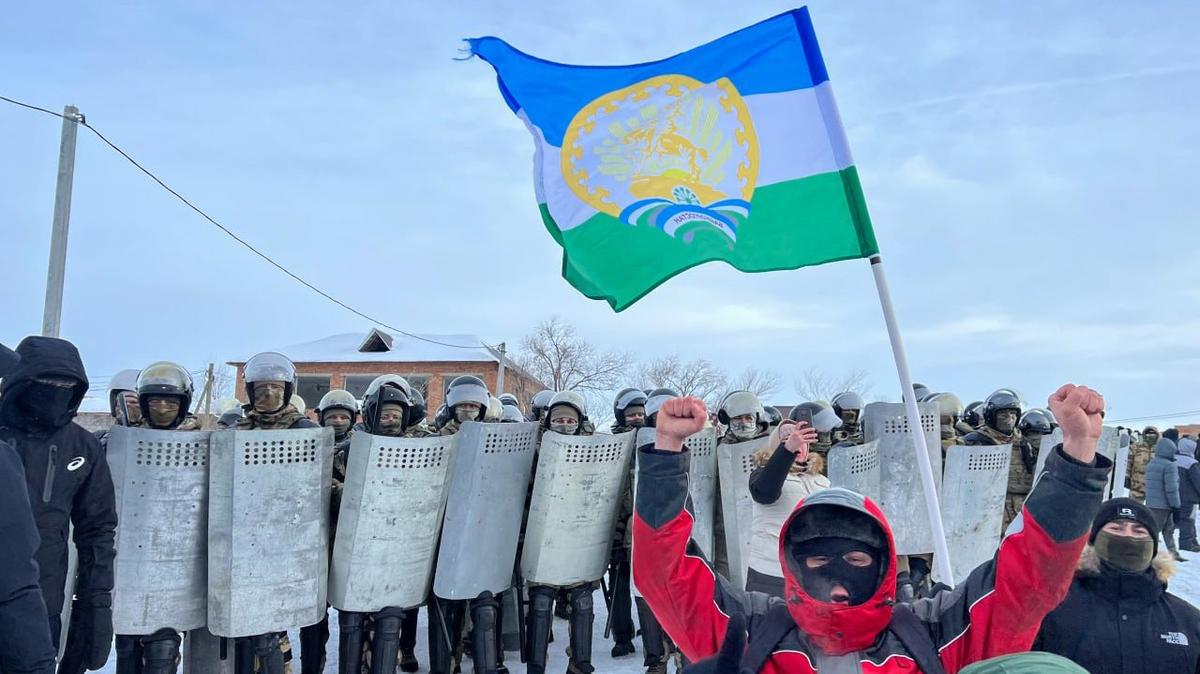Some of the largest protests in Russia since the start of the war in Ukraine broke out in the central Russian republic of Bashkortostan this week, as a regional court found activist Fail Alsynov guilty of inciting racial hatred on Wednesday, handing him a four-year sentence for a speech he gave in April.
Addressing residents of the village of Ishmurzino in the Bashkir language last year, Alsynov spoke of both local problems and the war in Ukraine. At the end of his speech, he used the Bashkir term “kara khalyk”, translating to “black people”.
Hearing those words, Radiy Khabirov, the head of Bashkortostan, and no stranger to Alsynov and his activities, saw a golden opportunity and personally requested that the local prosecutor’s office open a case against Alsynov for inciting racial hatred, “discrediting” the Russian army and calling for extremism.
Alsynov’s sentence was due to be announced on Monday, but the court postponed the announcement until Wednesday after large crowds protesting against his prosecution gathered outside the court chanting “Freedom!” and “We are black people”. Alsynov, who was free to leave the courthouse on Monday, went and thanked those who had come out to show their solidarity. However, by Wednesday the crowds were even larger.
Given that since the anti-war protests in the spring of 2022, there have been no large-scale demonstrations in Russia amid almost daily reports of Kremlin critics being handed long prison sentences, the scale of the protests in Bashkortostan is impressive.
But who is Fail Alsynov and why are thousands of people willing to risk being detained by police to stand up for him?
Notes of a Bashkir Nationalist
Alsynov’s friend Ruslan Gabbasov, co-chairman of the Bashkir national movement Bashkort, and formerly a journalist at Idel.Realii, the Tatar-Bashkir service of Radio Liberty/Radio Free Europe, devoted an entire chapter of his 2023 book, Notes of a Bashkir Nationalist, to the 37-year-old.
Alsynov met Gabbasov at Kuk-Bure (Grey Wolf), a Bashkir cultural organisation advocating federalism, secular nationalism and democracy. Within two years, Alsynov had become the group’s deputy chairman and one of its key figures.
Kuk-Bure was small but influential. Its activists were highly astute and skilled at both gaining media coverage and finding work in official institutions. The movement’s name and logo — a wolf’s head — was a reference to Turkic mythology and pan-Turkism.
Gabbasov saw that Alsynov had an excellent command of Bashkir and was a popular and highly skilled orator. As a member of Kuk-Bure, he began working in the World Qoroltai of the Bashkirs, a congress of public Bashkir organisations in 2011, but was sacked in 2014, allegedly on the orders of the Bashkir government.
When Kuk-Bure split in 2014, Alsynov and Gabbasov founded a new movement, Bashkort, which was more radical than Kuk-Bure and also fostered ties with nationalists from other countries, primarily Turkey and Kazakhstan. Its activists held rallies in support of the Bashkir language and opposed the industrial development of Kushtau Mountain in 2018. But Bashkort also dissolved that year, after members accused Alsynov and Gabbasov of usurping power, of being provocateurs and that Bashkort had really been set up by the state.
Security forces leapt on the disarray. In December 2019, the Bashkortostan prosecutor’s office issued Bashkort with a warning for what it called extremist activity, and in May 2020, the organisation was declared to be extremist by the Bashkortostan Supreme Court.
That was the end of Bashkort, but Fail Alsynov was just getting started.

Fail Alsynov. Photo: social media
Uphill struggle
Alsynov has many large protest campaigns to his name, the most notable and successful of which were those against the extraction of limestone from Kushtau Mountain.
In late 2018, the Bashkir Soda Company (BSC), the largest industrial company in the republic, was due to start mining Kushtau Mountain for limestone. The move was announced by the acting head of the republic, Radiy Khabirov, who was also on the board of directors of a state-owned company, which owned about half the shares in BSC.
In June 2020, a BSC subsidiary was due to begin geological exploration on a parcel of forest on Kushtau. If it began extracting raw materials, the mountain could end up being destroyed.
Shihans are isolated chalk hills. There were once four in Bashkortostan, all remnants of reefs in seas from the early Permian period of millions of years ago. Three remain. Shakhtau, the fourth, was destroyed in the second half of the last century and is now just a quarry. The others were given protected status in 1965 and 1985. Only Kushtau remained, and was likely to meet the same fate as Shakhtau, until environmental activists and interested locals leapt to its defence.

The Kushtau protests in 2020. Photo: social media
Shihans are sacred to Bashkirs. They are bound up with numerous folk epics, legends and myths. Locals set up a protest camp at the shihan’s base. Former activists from the now banned Bashkort also came to defend Kushtau. BSC hired a private security company to try to drive the activists out, but it didn’t work. The activists were there round the clock. The security company was soon joined by police and thugs for hire. Several people were injured and some were detained in the ensuing clashes, but the number of people defending Kushtau had now swelled to the thousands.
On 16 August 2020, the head of the republic Radiy Khabirov came out to meet the defenders and promised that all work would stop until the parties could reach a compromise. Two weeks later, the Bashkortostan government officially granted Kushtau protected status in what amounted to a rare victory for grass roots protesters in Russia.
Folk hero?
Alsynov continued his activism in the wake of the Kushtau victory, despite being detained on multiple occasions and being threatened with prosecution. Meanwhile, Gabbasov, his closest associate, chose to emigrate to Lithuania in 2021.
In the autumn of 2022, Alsynov was detained by police within days of coming out publicly against the war in Ukraine and mobilisation, calling the latter a genocide against the Bashkir nation. Two administrative offence reports were drawn up against Alsynov: for violating rules on tinted car windows and for disobeying police officers. In December he was detained again, this time by FSB officers in connection with another administrative offence — this time “discrediting the army” — for which he was fined 10,000 rubles (€135) for “inciting hatred or enmity”.
In March, FSB officers searched Alsynov’s home, but he remained a free man.
In April, Alsynov attended a meeting in the village of Ishmurzino, where residents had long been protesting against the issuing of exploration licences to gold mining companies operating in the local area. In the speech he delivered that day, which would later form the basis of the criminal case against him, he spoke about the war in Ukraine and about gold mining in the district, while urging the men present not to drink to excess but “to turn to the faith and protect their lands”. He also mentioned non-Bashkirs.
“Armenians will go to their homeland, ‘kara khalyk’ to theirs, Russians to Ryazan and Tatars to Tatarstan. We can’t go anywhere. We have no other home. Our home is here!”
Differing interpretations of the words “kara khalyk”, literally “black people”, have been at the centre of the criminal case against Alsynov. Interpretations ranged from “hard workers” to a racial slur against black people. Some have argued that the term simply means “ordinary people” and was not at all derogatory.

Fail Alsynov outside the court building. Photo: Proofy
Still nursing his humiliation at the hands of Alsynov and the protest movement, Khabirov unsurprisingly backed the interpretation that would lay Alsynov open to charges of inciting extremism. A criminal case was duly opened against Alsynov in August, and though he remained at liberty in the run-up to his trial, he was forbidden from leaving the country.
Alsynov is sure that Khabirov considers him his personal nemesis for the victory over Kushtau.
Many high-profile Bashkirs spoke up in support of Alsynov, as did ordinary activists. Some “volunteers” fighting for Russia in Ukraine spoke up for him too. A video appeared on Alsynov’s Telegram channel of eight men in military fatigues who claimed to be “in the special military operation zone” asking the court to release Alsynov.
Khabirov has now broken his silence over this week’s protests in a post on his Telegram channel on Thursday, in which he described the protesters as “a group of people, some of whom live abroad, who are basically traitors, calling for Bashkortostan to secede from Russia. They want guerrilla warfare”.
Khabirov did at least concede that he should accept some blame for his failure to “fully unmask these people’s true nature and ideas”. However, despite his jail sentence, it seems almost certain that we’ll be hearing more from Alsynov in the future.
Join us in rebuilding Novaya Gazeta Europe
The Russian government has banned independent media. We were forced to leave our country in order to keep doing our job, telling our readers about what is going on Russia, Ukraine and Europe.
We will continue fighting against warfare and dictatorship. We believe that freedom of speech is the most efficient antidote against tyranny. Support us financially to help us fight for peace and freedom.
By clicking the Support button, you agree to the processing of your personal data.
To cancel a regular donation, please write to [email protected]

